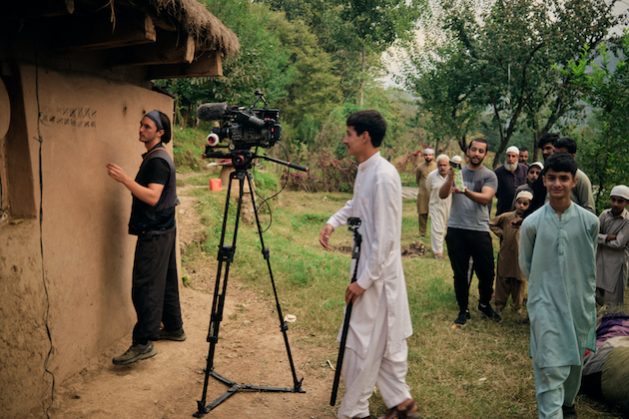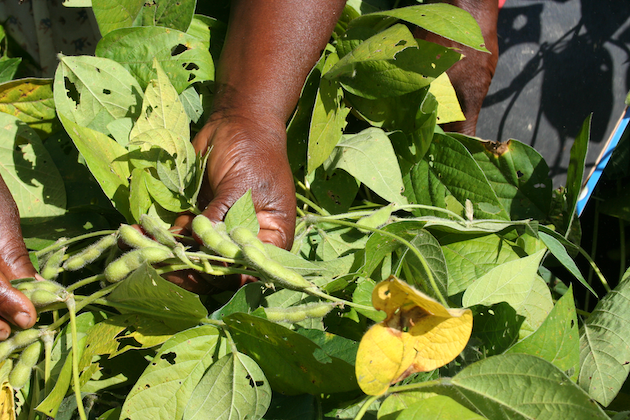Tracking the Impact of Science on Biodiversity Conservation

Bulawayo, Dec 19 (IPS) - Billy Offland (21), a British sustainability student, went on a two-year 'World Conservation Journey' to bring attention to the biodiversity crisis as the world seeks a deal to protect nature.
Offland, a BSc Sustainability and Environmental Management student at the University of Leeds, was jolted into taking a solo research trip after reading the Intergovernmental Science-Policy Platform on Biodiversity and Ecosystem Services (IPBES) Global Assessment report highlighting the perilous state of the world's biodiversity. The IPBES assessment notes that more than one million species of plants and animals face extinction more than ever before in human history.
Getting up and taking action is always a big decision. There's no easy way of starting your journey into activism or ‘actionism’ – changing a big part of your life for something you believe in.
“It took something as ground-breaking as the IPBES Global Assessment for me – but really, as soon as I read it, I knew I had to do something,” Offland told IPS in an interview from Azad Kashmir, Pakistan, where he is making the first foreign film about the battle for beekeepers to continue producing medicinal honey as the impacts of climate change threaten to wash away their pot of gold.
"The scale of the report is unlike anything else and contains messages which defy time. I always saw it as a culmination of everything I had learnt, discovered, and been told in my previous 22 years, including (completing a) degree in sustainability and environmental management. It laid it all bare."
Offland said the grim narrative of the IPBES assessment left him questioning why people are unaware of this impending catastrophe and why it was not front-page news.
"In my eyes, the best thing about this report was that it came from the knowledge of hundreds of not just scientists and researchers but included, for the first time ever, the traditional knowledge of communities all around the world," said Offland, who has now visited 196 countries worldwide. He plans to visit Eritrea as the final country of his sustainability tour.
"The most important thing I've learnt is that our global nature system is being destroyed by the actions of the majority of humans, and this has terrible consequences for nature – with it being predicted that a million species are at risk of extinction in the coming decades. This will also bring severe negative consequences for the livelihoods and wellbeing of so many people across the globe."
Offland's response to the biodiversity crisis, signalled by the IPBES Global Assessment, underscores the power that scientific research has to highlight the nature crisis and to mobilise and motivate real action by individuals and organisations to bring our world back from the brink.
The Global Assessment also found that the average abundance of native species in most major land-based habitats has fallen by at least 20 percent, mostly since 1900. More than 40 percent of amphibian species, almost 33 percent of reef-forming corals and more than a third of all marine mammals are threatened. The picture is less clear for insect species, but available evidence supports a tentative estimate of 10 percent being threatened.
It gets worse. The assessment further found that at least 680 vertebrate species had been driven to extinction since the 16th century. More than 9 percent of all domesticated breeds of mammals used for food and agriculture had become extinct by 2016, with at least 1,000 more species still threatened.
The work of IPBES has also influenced policy change across the world. Following the discussions and agreement at the BES-Net Anglophone Africa Regional Trialogue, policy, science and practice sector representatives in Nigeria, for example, convened to refine a two-year strategic action plan for pollinator-friendly land degradation neutrality. This was a means to act on the IPBES thematic assessments on pollinators and land restoration.
The authors built on the earlier findings of the IPBES Regional Assessment Report for Africa to show what is changing in biodiversity and ecosystem services on the African continent. They also identified future pathways and options for an African continent where long-term development objectives are recognised as inseparably connected to conserving the region's rich biocultural heritage.
As another direct impact of IPBES work, taking note of the urgency of the Global Assessment, 30 leading South African businesses teamed up with World Wide Fund South Africa and the Wildlife Trust (EWT) to undertake biodiversity valuation assessments to determine how to cost-effectively mainstream biodiversity into their strategies and practices.
The businesses indicated that given the key findings of the IPBES report, "there was, ‘more than ever’, a need for them to step up their biodiversity game."
These are just some of many examples of governments, businesses, practitioners and individuals who took biodiversity science to heart and set out to make a difference. To document the impact of its work, IPBES developed its own Impact Tracking Database (TRACK) five years ago. It is a crowd-sourced tool that keeps track of, for example, new or changed laws, regulations, policy commitments, investments, research techniques, and more, that were inspired by the scientific reports published by the platform.
Rob Spaull, Head of Communications at IPBES, explains that IPBES realised it could not comprehensively monitor impacts globally.
"So, we decided to create an indicative list of these impacts whenever we found out about them," Spaull said. He notes that the TRACK is a fully public database that can be used by anybody who wants to know about what kind of impacts IPBES has had or to submit an example of an IPBES impact themselves.
"The idea behind wanting to make it public and as searchable is that we want to give everybody interested in IPBES a chance to tell stories about the work that we do and the impact that we are having, but we want them to be able to find stories that are as closely related to their own priorities as possible," Spaull tells IPS.
TRACK to date has almost 500 different specific examples of impact from every region and most countries and every kind of scale, including the private sector.
"TRACK is a really valuable asset that, we think, shows how science can have a very direct impact and that it does not need to be restricted to scientific publications that may end up gathering dust on a shelf somewhere. It can take a little time for science to result in concrete change, but thanks to the TRACK database we can trace the impact over time," said Spaull.
This in itself is great news for the scientists who volunteer years of their time to work on IPBES assessments, but it can also be used to bring about even more change: Spaull added that member States had told IPBES they had used the examples collected in TRACK when advocating to their ministries and government organisations about the importance of IPBES in highlighting the science behind biodiversity issues worldwide, a strategy that can ultimately bring about even more support for biodiversity science.

At the COP15 Biodiversity Conference in Montreal, UN Secretary-General, António Guterres, said that the destruction of biodiversity and nature has come at a huge price for humanity.
"Humanity has become a weapon of mass extinction… with a million species at risk of disappearing forever," said Guterres, noting that climate action and biodiversity protection were two sides of the same coin.
"It's time for the world to adopt an ambitious biodiversity framework — a true peace pact with nature — to deliver a green, healthy future for all."
IPBES science can be found in many places, such as in the draft Global Biodiversity Framework that is being discussed at the COP.
What does Offland make of the current global action to save biodiversity at COP15 in Montreal?
"There's no doubt for me that we're making progress," Offland told IPS, adding, "The worry is that it's not the transformative change that we need to see. Often the biodiversity crisis is subjugated under the need for climate action, but recent work noticeably by IPBES and the IPCC seeks to reconcile the two.”
Offland has a vision for a summit where biodiversity takes an equal level of priority.
“I would quite like to see an intermediary COP for biodiversity and climate change together, recognising the importance of treating both together and not in silos and, therefore, giving the biodiversity crisis the priority it requires across every country in the world."
Meanwhile, it is hopeful that biodiversity science will continue to make an impact at different scales, whether it’s on the global scale of a COP or on the individual scale as with Offland himself. Truly transformative change will need to occur at all levels of society.
IPS UN Bureau Report
Follow @IPSNewsUNBureau
Follow IPS News UN Bureau on Instagram
© Inter Press Service (2022) — All Rights Reserved. Original source: Inter Press Service

